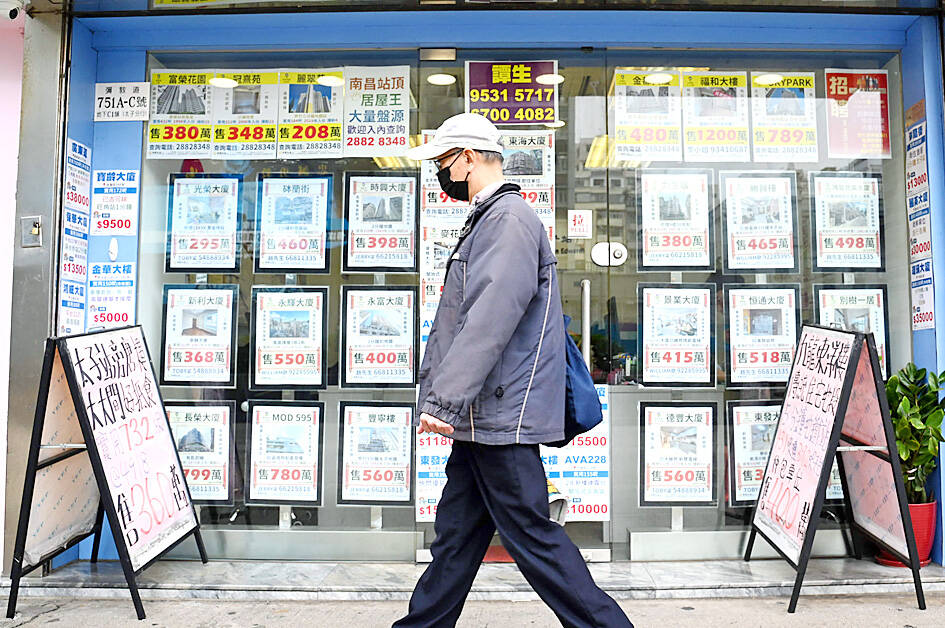Hong Kong has axed three major property transaction taxes in a bid to revive its depressed housing market, Hong Kong Financial Secretary Paul Chan (陳茂波) said in his annual budget speech yesterday.
The territory is among the world’s least-affordable residential markets, but home prices retreated last year amid high interest rates and an economic slowdown in China.
Hong Kong immediately scrapped three types of stamp duty, reversing measures introduced more than a decade ago to rein in speculation fueled in part by mainland Chinese buyers, Chan said.

Photo: AFP
“After prudent consideration of the overall current situation, we decide to cancel all demand-side management measures for residential properties with immediate effect,” Chan told the legislature.
The canceled taxes include stamp duties — which were once as high as 15 percent — imposed on property buyers who are not Hong Kong permanent residents and on those purchasing a second home.
“No Special Stamp Duty, Buyer’s Stamp Duty or New Residential Stamp Duty needs to be paid for any residential property transactions starting from today,” Chan said.
“We consider that the relevant measures are no longer necessary amidst the current economic and market conditions,” he said, adding that residential market sentiment became “very cautious” since the middle of last year.
Hong Kong had already reduced stamp duty in October last year in a bid to revive the market, but the reception had been largely muted.
Prices for apartments fell 7 percent last year and transactions slid 5 percent to about 43,000.
The weak housing market has also hurt public finances, with the Hong Kong government heavily reliant on land sales for revenue, but only netting HK$19.4 billion (US$2.5 billion) last year.
Hong Kong recorded a HK$102 billion deficit in 2023-2024, with fiscal reserves falling to HK$733 billion due to “challenges posed by the epidemic and external environment,” Chan said.
Hong Kong’s economy is expected to grow 2.5 percent to 3.5 percent this year, Chan said, aided by factors such as an expected interest rate cut by the US Federal Reserve.
“Amid a complicated and ever-changing international environment ... more strenuous efforts are required to strengthen momentum of our economic recovery,” Chan said.
He also pledged about HK$1 billion for tourism development, including funds for “mega events,” and monthly fireworks and drone shows over Victoria Harbour.
Hong Kong last year had about 34 million visitor arrivals, down from record levels of 65 million in 2018.
The Hong Kong Monetary Authority also relaxed mortgage rules, allowing homebuyers to borrow more, and eased an income-related stress test.

MULTIFACETED: A task force has analyzed possible scenarios and created responses to assist domestic industries in dealing with US tariffs, the economics minister said The Executive Yuan is tomorrow to announce countermeasures to US President Donald Trump’s planned reciprocal tariffs, although the details of the plan would not be made public until Monday next week, Minister of Economic Affairs J.W. Kuo (郭智輝) said yesterday. The Cabinet established an economic and trade task force in November last year to deal with US trade and tariff related issues, Kuo told reporters outside the legislature in Taipei. The task force has been analyzing and evaluating all kinds of scenarios to identify suitable responses and determine how best to assist domestic industries in managing the effects of Trump’s tariffs, he

TIGHT-LIPPED: UMC said it had no merger plans at the moment, after Nikkei Asia reported that the firm and GlobalFoundries were considering restarting merger talks United Microelectronics Corp (UMC, 聯電), the world’s No. 4 contract chipmaker, yesterday launched a new US$5 billion 12-inch chip factory in Singapore as part of its latest effort to diversify its manufacturing footprint amid growing geopolitical risks. The new factory, adjacent to UMC’s existing Singapore fab in the Pasir Res Wafer Fab Park, is scheduled to enter volume production next year, utilizing mature 22-nanometer and 28-nanometer process technologies, UMC said in a statement. The company plans to invest US$5 billion during the first phase of the new fab, which would have an installed capacity of 30,000 12-inch wafers per month, it said. The

Taiwan’s official purchasing managers’ index (PMI) last month rose 0.2 percentage points to 54.2, in a second consecutive month of expansion, thanks to front-loading demand intended to avoid potential US tariff hikes, the Chung-Hua Institution for Economic Research (CIER, 中華經濟研究院) said yesterday. While short-term demand appeared robust, uncertainties rose due to US President Donald Trump’s unpredictable trade policy, CIER president Lien Hsien-ming (連賢明) told a news conference in Taipei. Taiwan’s economy this year would be characterized by high-level fluctuations and the volatility would be wilder than most expect, Lien said Demand for electronics, particularly semiconductors, continues to benefit from US technology giants’ effort

‘SWASTICAR’: Tesla CEO Elon Musk’s close association with Donald Trump has prompted opponents to brand him a ‘Nazi’ and resulted in a dramatic drop in sales Demonstrators descended on Tesla Inc dealerships across the US, and in Europe and Canada on Saturday to protest company chief Elon Musk, who has amassed extraordinary power as a top adviser to US President Donald Trump. Waving signs with messages such as “Musk is stealing our money” and “Reclaim our country,” the protests largely took place peacefully following fiery episodes of vandalism on Tesla vehicles, dealerships and other facilities in recent weeks that US officials have denounced as terrorism. Hundreds rallied on Saturday outside the Tesla dealership in Manhattan. Some blasted Musk, the world’s richest man, while others demanded the shuttering of his